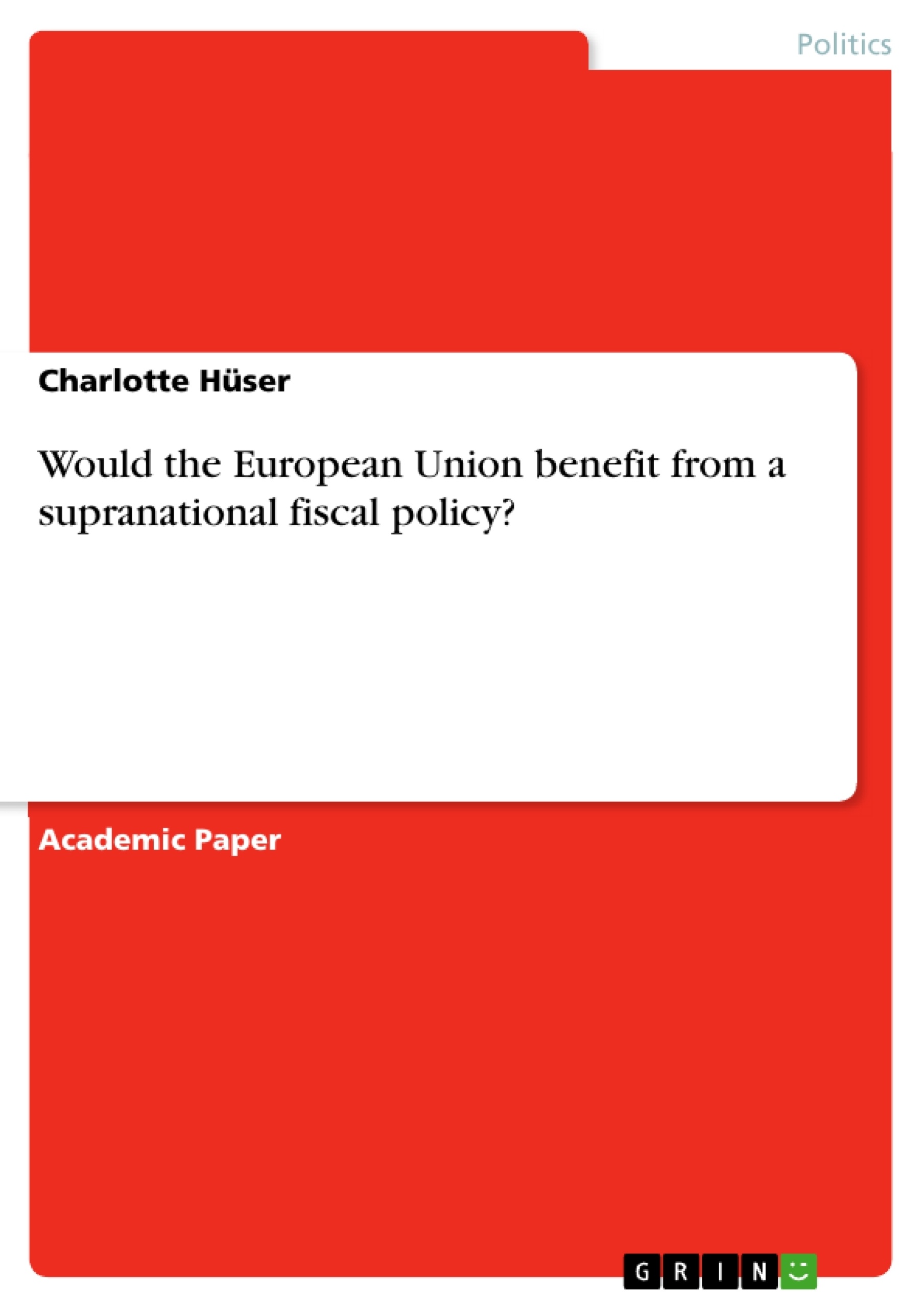At least since the financial crisis, the European Union (EU) discusses about the introduction of common fiscal policies. A fiscal union, seen as a deeper integration of EU politics and economy, would have many advantages. Those would for example include a fairer distribution of funds, protection against macroeconomic shocks and the introduction of a concrete legal regulation for current supportive flows of money from the wealthy to the poorer states of the EU. However, there are also arguments against the fiscal union, among other things the possibility of moral hazard, as well as the fear of losing sovereignty to the EU and the distance between the citizens and the EU institutions due to lack of communication. It would have to be communicated to the citizens that a fiscal union, leading to a larger budget, would enable the EU to work more efficient and deal with its current problems.
Inhaltsverzeichnis (Table of Contents)
- Introduction
- The monetarism of the EU
- Next step to a further integration in the EU: Common fiscal policies?
- Fiscal union
- Discussion and summary
Zielsetzung und Themenschwerpunkte (Objectives and Key Themes)
This paper explores the potential benefits and drawbacks of introducing a supranational fiscal policy within the European Union (EU). The paper aims to understand the implications of a fiscal union for the EU's economic and political landscape, taking into account the historical context of the EU's monetary union.
- The EU's current monetary union and its limitations
- The potential benefits of a fiscal union, including fairer distribution of funds, protection against economic shocks, and a more efficient allocation of resources
- The challenges associated with a fiscal union, such as concerns about moral hazard, loss of national sovereignty, and potential for increased distance between EU institutions and citizens
- The need for transparent communication and public support for a fiscal union
- The historical development of the EU's budget and the potential role of a supranational fiscal policy in addressing contemporary economic challenges
Zusammenfassung der Kapitel (Chapter Summaries)
- Introduction: This chapter provides an overview of the European Union (EU) and the historical context of the ongoing debate regarding the introduction of common fiscal policies. It highlights the need to thoroughly examine the concept of a fiscal union, as well as its potential benefits and drawbacks.
- The monetarism of the EU: This chapter examines the development of the EU's monetary union, tracing its origins to the European Coal and Steel Community (ECSC) and its evolution through the creation of the European Currency Unit (ECU). It delves into the Economic and Monetary Union (EMU) and the "convergence criteria" that member states must meet to adopt the Euro. The chapter also discusses the current state of the EU budget and its limitations.
Schlüsselwörter (Keywords)
This paper focuses on the European Union (EU), fiscal union, monetary union, supranational fiscal policy, economic integration, moral hazard, sovereignty, public finance, EU budget, and the impact of a fiscal union on the distribution of funds, macroeconomic shocks, and citizen engagement.
Frequently Asked Questions
What is a supranational fiscal policy in the EU?
It refers to a common fiscal union where the EU has a larger central budget and the power to coordinate taxes and spending across member states.
What are the advantages of a fiscal union?
Potential benefits include fairer distribution of funds, better protection against macroeconomic shocks, and more efficient handling of EU-wide problems.
What is "moral hazard" in the context of EU fiscal policy?
Moral hazard refers to the risk that member states might act financially irresponsibly if they know that other EU countries will bail them out via a common budget.
How does the current EU monetary union differ from a fiscal union?
The EU currently has a common currency (monetary union) but separate national budgets; a fiscal union would centralize economic and budgetary decisions.
Why do some oppose a supranational fiscal policy?
Main arguments include the loss of national sovereignty and a perceived distance between citizens and EU institutions due to a lack of communication.
- Quote paper
- Charlotte Hüser (Author), 2017, Would the European Union benefit from a supranational fiscal policy?, Munich, GRIN Verlag, https://www.grin.com/document/510350



